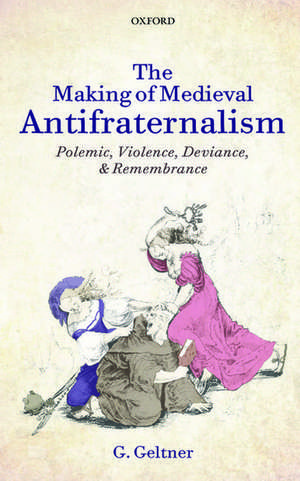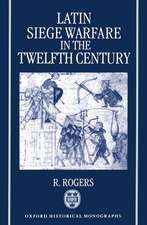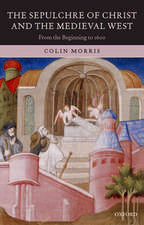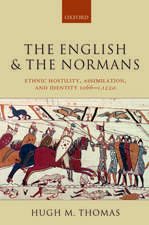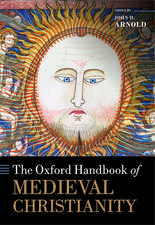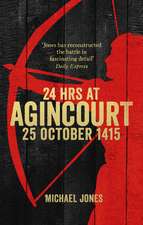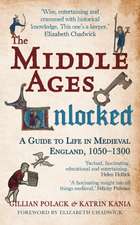The Making of Medieval Antifraternalism: Polemic, Violence, Deviance, and Remembrance
Autor G. Geltneren Limba Engleză Hardback – 4 apr 2012
Preț: 802.21 lei
Preț vechi: 1154.84 lei
-31% Nou
Puncte Express: 1203
Preț estimativ în valută:
153.52€ • 166.70$ • 128.96£
153.52€ • 166.70$ • 128.96£
Carte tipărită la comandă
Livrare economică 12-18 aprilie
Preluare comenzi: 021 569.72.76
Specificații
ISBN-13: 9780199639458
ISBN-10: 0199639450
Pagini: 206
Ilustrații: 4 black and white images
Dimensiuni: 160 x 241 x 20 mm
Greutate: 0.48 kg
Editura: OUP OXFORD
Colecția OUP Oxford
Locul publicării:Oxford, United Kingdom
ISBN-10: 0199639450
Pagini: 206
Ilustrații: 4 black and white images
Dimensiuni: 160 x 241 x 20 mm
Greutate: 0.48 kg
Editura: OUP OXFORD
Colecția OUP Oxford
Locul publicării:Oxford, United Kingdom
Recenzii
...an important book. It provides us with a significant corrective to an over-reliance on evidence from literary and theological works in understanding criticisms of the friars in the Middle Ages, and Geltner's argument for the contribution of the friars' own historiography to the development of the antifraternal tradition offers a whole new perspective on that process. Most important, however, Geltner brings this material together in a call for a comprehensive revision of how we think about antifraternalism.
Geltners finely crafted book is a significant contribution to the study of the medieval mendicant orders and their place in medieval Europe.
This is an interesting short book that brings to life an aspect of literary history that has been deaf to the ideas and behaviour of real people.
Geltner effortlessly segues from analysis of texts and textual reception to social and quantitative methodologies ... will be most useful to fellow specialists or upper graduate level students.
Guy Geltner's book is an important contribution to the ongoing historiography of the mendicant orders in the Middle Ages.
this stimulating and innovative study is enriched by archival evidence that brings a fresh perspective to the analysis of the friars impact on the thirteenth and fourteenth centuries.
Geltner's study is a compelling read (references to Erik the Viking are always welcome) based on an innovative interpretation of an impressively wide range of evidence,
an important book ... it brings new lights and reflections on the phenomenon of antifraternalism (and anticlericalism). Geltner's research is wide and deep, and his presentation is clearly articulated.
Geltners finely crafted book is a significant contribution to the study of the medieval mendicant orders and their place in medieval Europe.
This is an interesting short book that brings to life an aspect of literary history that has been deaf to the ideas and behaviour of real people.
Geltner effortlessly segues from analysis of texts and textual reception to social and quantitative methodologies ... will be most useful to fellow specialists or upper graduate level students.
Guy Geltner's book is an important contribution to the ongoing historiography of the mendicant orders in the Middle Ages.
this stimulating and innovative study is enriched by archival evidence that brings a fresh perspective to the analysis of the friars impact on the thirteenth and fourteenth centuries.
Geltner's study is a compelling read (references to Erik the Viking are always welcome) based on an innovative interpretation of an impressively wide range of evidence,
an important book ... it brings new lights and reflections on the phenomenon of antifraternalism (and anticlericalism). Geltner's research is wide and deep, and his presentation is clearly articulated.
Notă biografică
Guy Geltner is Professor of Medieval History at the University of Amsterdam and Director of The Center for Medieval Studies Amsterdam. His research focuses on the social, environmental, and religious history of the late Middle Ages, especially in an urban context. He has published The Medieval Prison: A Social History (2008); William of St. Amour's De periculis novissimorum temporum (2008), and Defenders and Critics of Franciscan Life (co-edited with Michael F. Cusato; 2009).
